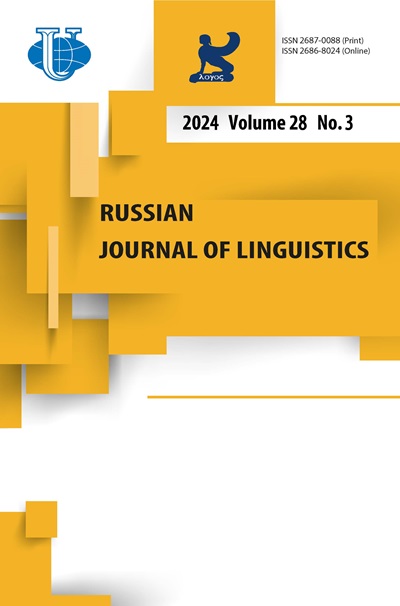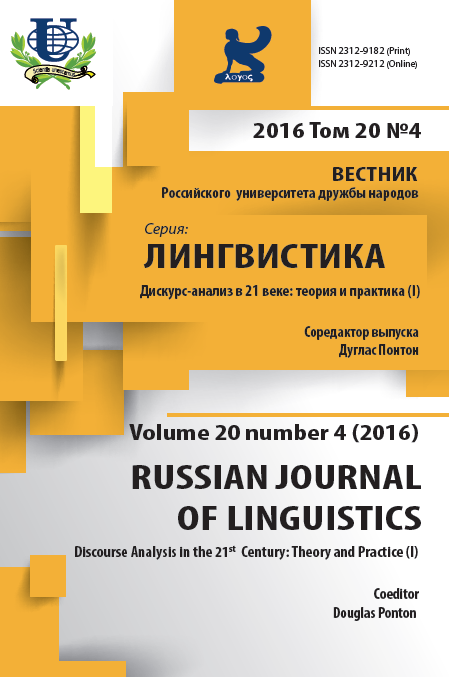Дискурс-анализ и прагматика: область исследования и взаимосвязь
- Авторы: Альба-Хуэс Л.1
-
Учреждения:
- Национальный университет дистанционного образования
- Выпуск: Том 20, № 4 (2016): Дискурс-анализ в 21 веке: теория и практика (I)
- Страницы: 43-55
- Раздел: Статьи
- URL: https://journals.rudn.ru/linguistics/article/view/15147
- DOI: https://doi.org/10.22363/2687-0088-15147
Цитировать
Полный текст
Аннотация
В данной статье автор детально описывает такие научные направления, как дискурс-анализ и прагматика, пытаясь решить сложную задачу - определить область исследования, а также выявить их сходства и различия, с тем чтобы дать общее представление об уровне развития обеих дисцсиплин в 21 веке. Ввиду того, что изучение трудов исследователей в любой научной отрасли является очень важным, в особенности, в том случае, когда научные направления трудно разграничить, автор также рассматривает конкретные работы ученых в сфере прагматики и дискурс-анализа. В статье описаны различные подходы к определению концептов «текст» и «дискурс» через анализ исследований в области лингвистики текста и дискурс-анализа. Кроме того, автор представляет ретроспективу развития данных понятий с момента их возникновения и до настоящего времени. Также описываются основные школы прагматики - Англо-американская и Континентально-европейская школы (Huang 2016) - и сопоставлются их идеи в области дискурс-анализа. В понимании автора прагматика отличается от дискурс-анализа, но в то же время является для него необходимым источником: не имея достаточных знаний прагматики и ее взаимосвязи с дискурс-анализом, невозможно анализировать дискурс (Alba-Juez, 2009:46). В статье также рассматриваются некоторые значимые для исследования понятия и вопросы, например контекст, сознание и культура , а также обозначена необходимость развития прагматической компетенции.
Ключевые слова
Об авторах
Лаура Альба-Хуэс
Национальный университет дистанционного образования
Email: lalba@flog.uned.es
28040, Мадрид, Испания, 7 Passeo Senda del Rey
Список литературы
- Alba-Juez, Laura (2001 [1996]). The Functions and Strategies of Ironic Discourse: An Analysis. Madrid: Universidad Complutense de Madrid. Doctoral Thesis
- Alba-Juez, Laura (2009). Perspectives on Discourse Analysis: Theory and Practice. Newcastle Upon Tyne: Cambridge Scholars Publishing
- Alba-Juez, Laura (2014). Irony as inferred contradiction. In: Vestnik of People’s Friendship University of Russia. Linguistics Series, 2014, nº 4. 140-153
- Alba-Juez, Laura & Salvatore Attardo (2014). The evaluative palette of verbal irony. In Geoff Thompson & Laura Alba-Juez (eds), Evaluation in Context. Amsterdam: John Benjamins. 93-115
- Alba-Juez, Laura & Mackenzie, J. Lachlan (2016). Pragmatics: Cognition, Context and Culture. Madrid: McGraw Hill
- Ariel, Mira. (2010). Defining pragmatics. Cambridge: Cambridge University Press
- Bourdieu, Pierre (1990). The Logic of Practice. Stanford: Stanford University Press
- Bublitz, Wolfram & Neal R. Norrick. (2011). The burgeoning field of pragmatics. In Wolfram Bublitz & Neal R. Norrick (eds.), Foundations of pragmatics, 1-20. Berlin: De Gruyter Mouton
- Brown, G. & G. Yule (1983). Discourse Analysis. Cambridge: Cambridge University Press
- Candlin, C.N. (1997). General editor’s preface. In Gunnarsson, B.-L., Linell, P. and Nordberg, B. (eds.). The Construction of Professional Discourse. London: Longman, ix-xiv
- Chafe, William (1980). The deployment of consciousness in the production of a narrative. In W. Chafe (ed.), The Pear Stories: Cognitive, Cultural and Linguistic Aspects of Narrative Production. Norwood, NJ: Ablex Press, 9-50
- Chafe, William (1987). Cognitive constraints on information flow. In R. Tomlin (ed.), Coherence and Grounding in Discourse. Amsterdam: John Benjamins, 21-51
- Chafe, William (1992). Prosodic and functional units of language. In J. Edwards and M. Lampert (eds.), Talking Data: Transcription and Coding in Discourse Research. Hillsdale, NJ: Lawrence Erlbaum Associates
- Crystal, D. (1997). A Dictionary of Linguistics and Phonetics. Oxford: Blackwell
- Cummings, Louise. (2005). Pragmatics: A multidisciplinary perspective. Edinburgh: Edinburgh University Press
- de Beaugrande, R. (1997). New Foundations for a Science of Text and Discourse: Cognition, Communication, and the Freedom of Access to Knowledge and Society. Vol. LXI in the series Advances in Discourse Processes, R. O. Freedle (ed.). Norwood, NJ: Ablex Publishing
- de Beaugrande, R. & W. Dressler (1981). Introduction to Text Linguistics. London & New York: Longman
- Dewaele, Jean Marc (2013). Emotions in Multiple Languages. London: Palgrave Macmillan
- Dooley, Robert A. & Stephen H. Levinsohn (2000). Analyzing Discourse: A Manual of Basic Concepts. North Dakota: SIL International & University of North Dakota
- Fairclough, N. (1989). Language and Power. London: Longman
- Fasold, R. (1990). Sociolinguistics of Language. Oxford: Blackwell
- Foolen, Ad (2012). The relevance of emotion for language and linguistics. In Ad Foolen, Ulrike M. Lüdtke, Timothy P. Racine & Jordan Zlatev (eds.). In Moving Ourselves, Moving Others: Motion and Emotion in Intersubjectivity, Consciousness and Language. Amsterdam & Philadelphia, PA: John Benjamins. 347-368
- Foolen, Ad (2016). Expressives. In Nick Riemer (ed.), The Routledge Handbook on Semantics. London & New York: Taylor and Francis, 473-490
- Forceville, Charles & Billy Clark (2014). Can pictures have explicatures? Linguagem em (Dis)curso 14(3). 451-472
- Foucault, M. (1972). The Archaeology of Knowledge. London: Tavistock
- Grice, H.P. (1975). Logic and conversation. In P. Cole and J. Morgan (eds.) Syntax and Semantics 3: Speech Acts. New York: Academic Press, 41-58
- Halliday, Michael A.K. (1978). Language as Social Semiotic. London: Edward Arnold
- Huang, Yan (2016). Pragmatics: Language use in context. In Keith Allan (ed.), Routledge handbook of linguistics, 205-220. London & New York: Routledge
- Hunston, Susan & Geoff Thompson (eds.) (2000). Evaluation in Text: Authorial Stance and the Construction of Discourse. Oxford: Oxford University Press
- Johnson Laird, P.N. (1983). Mental Models: Towards a Cognitive Science of Language, Interference, and Consciousness. Cambridge, MA: Harvard University Press
- Johnstone, Barbara (2008). Discourse Analysis. Second Edition. Oxford: Blackwell Publishing
- Leech, Geoffrey N. (1983). Principles of pragmatics. London: Longman
- Levinson, Stephen C. (1983). Pragmatics. Cambridge: Cambridge University Press
- Martin, James R. & Peter R.R. White (2005). The Language of Evaluation: Appraisal in English. New York: Palgrave Macmillan
- Mey, Jacob L. (1993). Pragmatics: An introduction. 2nd edition. Oxford: Blackwell
- Schiffrin, Deborah (1994). Approaches to Discourse. Oxford: Basil Blackwell
- Slembrouck, S. (2006). What is meant by ‘discourse analysis’? Department of English, University of Gent. At: http://bank.rug.ac.be/da/da.htm
- Verschueren, Jef. (2009). Introduction: The pragmatic perspective. In Jef Verschueren & Jan-Ola Östman (eds.), Key notions for pragmatics, 1-27. Amsterdam & Philadelphia, PA: John Benjamins
- Thompson, Geoff & Laura Alba-Juez (eds.) (2014). Evaluation in Context. Amsterdam: John Benjamins
- Titscher, S.M., R. Meyer, R. Wodak & E. Vetter (2000). Methods of Text and Discourse Analysis. London: Sage
- Wetherell, M.; Taylor, S. & S.J. Yates (2001) (eds.). Discourse Theory and Practice: A Reader. London: Sage Publications
- Yule, George. (1996). Pragmatics. Oxford: Oxford University Press

















